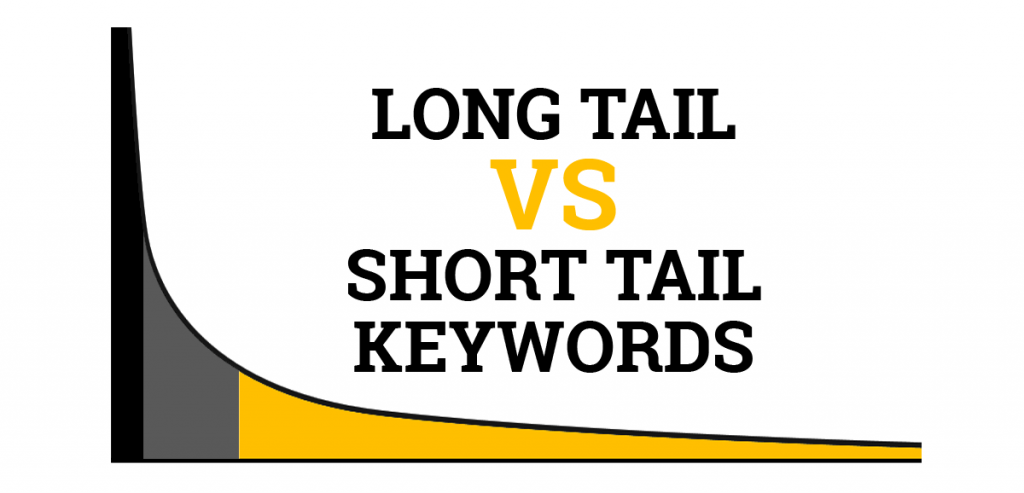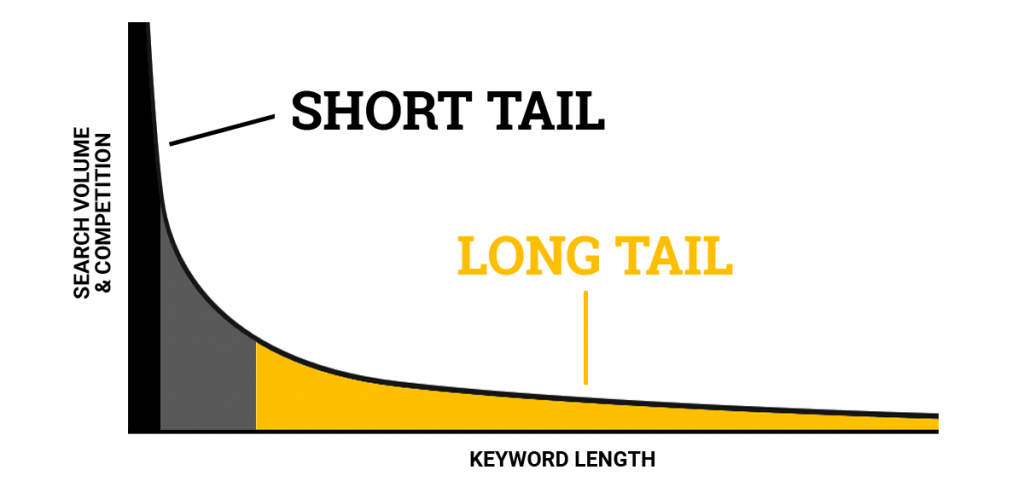The age old debate in SEO small business, real estate, and plumbing company circles…what’s the difference between long tail versus middle tail versus short tail keywords? What are the advantages and disadvantages in 2022? HINT: we LOVE long tail, especially in high competition areas. We’ll show examples and graphs to help the debate along…
In this article, we’re going to explore the long tail vs short tail keywords question.
Keyword research is an important part of any search engine optimization (SEO) or pay-per-click (PPC) campaign and choosing the best keywords for your website is crucial for long-term growth.
So we’ll explain everything you need to know about long tail keywords vs short tail keywords to help you make the right choice between these two options.
Consider this your complete comparison guide on the difference between short tail and long tail keywords for SEO and digital marketing success.

Long Tail vs Short Tail Keywords
The main difference between long tail and short tail keywords is that long tail keywords consist of four or more words while short tail keywords contain one to two words. These keywords are opposites because long tail keywords are targeted queries and short tail keywords refer to broad topics.
Difference Between Short Tail and Long Tail Keywords Comparison Chart
| Criteria | Short Tail Keywords | Long Tail Keywords |
|---|---|---|
| Number of Words | 1-2 words | 4 or more words |
| Keyword Goal | Broad traffic | Targeted traffic |
| Traffic Volume | High | Low |
| SEO Competition | High | Low |
| Conversion Rate | Low | High |
| PPC Ad Cost | High | Low |
| Search Intent | To find general information on a topic | To find very specific information on a topic |
| Total Search Traffic | 30% of search queries | 70% of search queries |
What Are Long Tail Keyword Examples?
Long tail keyword examples include 4 or more words such as “buy cheap running socks”, “hotels in Austin Texas”, “what is the color of grass”, “how do ducks quack”, “best protein powder for women”, and other long tail keyword phrases that cover specific topics.
What Are Short Tail Keyword Examples?
Short tail keyword examples include 1 or 2 words such as “egg”, “marketing”, “shoes”, “dogs”, “cat food”, “buy laptops”, “fast food”, “Chicago hotels”, “Miami weather”, “cheap sunglasses”, “baseball bats” and other short tail keyword terms that cover broad topics.

Short Tail Keyword Pros and Cons
Advantages of Short Tail Keywords
- Highest search volume
- Generates the most brand awareness
- Captures people at the top of the marketing funnel
- Web pages optimized for short tail keywords can rank for a wide variety of terms
Disadvantages of Short Tail Keywords
- Most competition for SEO and PPC
- Broadly focused rather than targeted topics
- Lowest conversion rates
- Web page content usually has to be long (e.g., 3,000 words or more)
Long Tail Keyword Pros and Cons
Advantages of Long Tail Keywords
- Lowest competition for SEO and PPC
- Highest conversion rates
- Can rank quickly in the search engines without many backlinks
- Captures people at the bottom of the marketing funnel
- Web page content doesn’t always have to be long (e.g., 500-1,000 words)
(For more details, see this complete list of benefits of long tail keywords for SEO.)
Disadvantages of Long Tail Keywords
- Lowest search volume
- Generates less brand awareness
- Web pages optimized for long tail keywords typically only rank for a specific phrase and close variations of it
- Requires a lot of web pages on a site when focusing on a long tail keyword strategy
Should Keywords Be Long or Short?
Keywords should be long when you want to get targeted traffic from the search engines that are easier to convert leads into customers. Short keywords should be used when you want to rank for generic terms to increase brand awareness rather than conversions.
(See the generic keywords meaning page for more details and examples of short keywords.)
Are Long Tail Keywords Better?
Long tail keywords are better for both users and site owners because they receive better results from the search engines and with pay-per-click (PPC) campaigns. Long tail keywords are also better for SEO because there is less competition for each keyword phrase.
However, a good SEO strategy will contain both long tail keywords and short tail keywords. Short tail keywords are best for setting up the main pillar content for your pillar content strategy while long tail keywords are better for the individual web pages that make up your SEO topic cluster strategy.
How Long Should a Keyword Be?
A keyword should be around 3-5 words to get the most impact from your SEO and PPC efforts. Keywords around this length have a good combination of traffic volume, search intent, lower competition, and higher conversions than keywords with one word or more than six words.
That doesn’t mean you can’t create web pages that are targeted for extra-long keywords that are more than the above recommendation. But just remember that these pages may not have a lot of monthly search traffic because they contain highly targeted search queries on the long tail of the digital marketing spectrum.
A good strategy to follow for SEO and PPC is this: the newer your website, the longer the keywords should be because they don’t require as much authority for ranking in the search engines and have lower cost-per click (CPC) costs.
As your website ages, builds authority, and generates more backlinks, the shorter the keywords you can go after because it become easier to rank in the search engines for more competitive terms and your budget may allow you to pay for higher CPC costs.
For more tips and ideas on picking the length of your keywords, check out my guide on how to choose the right keywords for SEO.

Long Tail Keywords vs Short Tail Keywords Summary
I hope you enjoyed this comparison guide on long tail vs short tail keywords.
As you discovered, the basic difference between short tail and long tail keywords is the number of words that make up each term or phrase. However, depending on the age of your website, advertising budget, and experience with SEO, will determine if you should focus on long tail keywords vs short tail keywords in your digital marketing strategy.
Both short tail and long tail keywords have their advantages and disadvantages, so you have to pick the option that makes the most sense for the current state of your website.
The post Long Tail vs Short Tail Keywords: What’s the Difference? first appeared on SEO Chatter.
About Lead Generation SEO Services…
We are media and company growth strategy specialists. How we can help your business:



